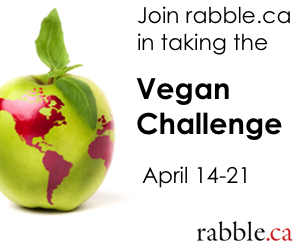Want more coverage of industrial farming, animal welfare and the environment? Support rabble.ca today!
Won’t somebody please think about the migrant workers?
Not many people do — except when they are faced with a vegan. And then the hand-wringing begins. “Don’t you know that people are out there in the fields picking your vegan food?” they say. The idea has even become fodder for comedians, another way at poking fun at a lifestyle that people are often uncomfortable with.
I’m not vegan — or vegetarian, for that matter — but I’ve seen this argument trotted out enough times to recognize how ridiculous it is. That veganism is anti-worker flies in the face of what we do know about how about food production and veganism. Here are four reasons why:
1. The argument is based on the fear of the vegan boogeyman
Popular culture has produced two vegan strawmen that colour how everyone else in the world reacts to vegans. The first one, the very scary vegan boogeyman, loves animals so much that they would give up their own lives or the lives of others if it meant saving one cow from the slaughter house.
The second is much less scary, and a lot more like Gwyneth Paltrow. This is a person who may have adopted veganism as a cause célèbre, without any care for the ethical concerns surrounding their choice.
Extremists exist in every corner of the world, and in almost every single one of those corners their peers disregard them because those ideas are illogical and unpractical. Unfortunately, however, those are often the people who get the most attention.
The same is true of vegans. I’ve known many people who have adopted this lifestyle over the years, and generally speaking their philosophy can be boiled down to the same points — they want to promote a lifestyle that is kinder overall, to both humans and animals.
But it’s the extreme vegans — the boogeymen — who get the attention and inspire reactions like, “you clearly don’t care about workers.”
2. The injustices faced by slaughterhouse workers are well documented
Slaughterhouse work is amongst the most dangerous work in the world. A Human Rights Watch report from 2005 outlines in gruesome detail the dangers slaughterhouse workers face daily, which includes the risk of severe injury that comes with having to “process” 1,000s of animals a day.
Organizing unions or asserting labour rights has proven very difficult for slaughterhouse workers. Many in North America are migrant workers, so they face language barriers that can stop them from even taking the initial steps necessary to form a union. If they get that far, management is quick to break any organization drive or attempt to bargain collectively.
This is not an uniquely American phenomenon. One of the most infamous Canadian cases of the abuse of migrant workers came from a fish processing plant just outside of Windsor, Ontario, in 2008. There, the workers, mostly women from Thailand, slept in an overcrowded bunkhouse and had their passports withheld by management. The owner of the plant, Joe Pratas, was also charged on nine counts of sexual assault.
Is going vegan instantly going to improve working conditions for slaughterhouse workers? No. But it will help slow what has become an insatiable demand for meat that requires those workers to be there and mistreated in the first place.
3. A lot of farms feed…animals
We’d like to think that every single farm in the world is producing food for us to eat, but that is simply not the case. Because of the demand for meat products, a large amount of crops are actually grown to feed livestock, or to provide fuel.
A University of Minnesota study produced last year found that only 55 per cent of crop calories worldwide provide direct human nourishment. The same study found that by shifting crop growth away from biofuels and livestock feed, we could feed four billion more people and greatly improve world food security.
Another thing to consider is who tends those crops that are feeding the cows destined to become steaks. While the typical image of an agricultural worker is someone picking tomatoes or apples, the truth is that you will find exploited people in just about every field — literally and figuratively, in this case.
So the next time someone asks you if they care about who picks the vegetables you’re eating, ask them if they care about who harvests the grains their animals fed on before they headed to the slaughterhouse.
4. Cheap labour is connected to cheap food
We, as a species, love meat. And we love to eat it cheaply. In order to do that, restaurants and grocery stores will cuts costs wherever they can. They find those savings, more often than not, by cutting the wages of employees.
This goes beyond the people serving you at the counter, or even the people working in the slaughterhouse. The workers in the fields — the same ones evoked whenever someone gets riled up over veganism — are picking tomatoes so that big corporations can provide toppings for your burgers and sauce for fries.
The cuts to wages come at every level of the supply chain. That’s why, when organizations like the Coalition of Immokalee Workers in Florida take action, they target chains like Wendy’s, not your local farmers market.
The vegans that I have the privilege of knowing understand this concept. That’s why, in addition to cutting meat and dairy out of their diet, they also try to understand more about where their food is produced.
Being vegan isn’t a choice that values animals above humans. It’s actually about valuing food and where it comes from, rather than just believing it magically appears on our plates. Doing that is one part of a larger puzzle that will help improve living and working conditions for everybody.



